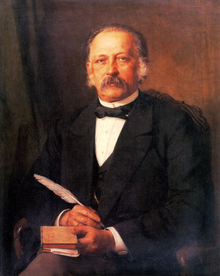
Back Theodor Fontane Afrikaans تيودور فونتانه Arabic تيودور فونتانه ARZ Teodor Fönten Azerbaijani تئودور فونتانه AZB Теодор Фонтане Bulgarian Theodor Fontane Breton Theodor Fontane BS Theodor Fontane Catalan Theodor Fontane Czech
Theodor Fontane | |
|---|---|
 Fontane (1883), painting by Carl Breitbach | |
| Born | 30 December 1819 Neuruppin, Brandenburg, Prussia |
| Died | 20 September 1898 (aged 78) Berlin, German Empire |
| Occupation | Writer |
| Nationality | German |
| Period | 19th century |
| Genre | Novel |
| Notable works | Effi Briest, On Tangled Paths, The Stechlin, Frau Jenny Treibel |
| Spouse | Emilie Rouanet-Kummer (1824–1902; m. 1850, until his death) |
| Children | 7 (four of them lived into adulthood) |
Theodor Fontane (German pronunciation: [ˈtʰeːodoɐ̯ fɔnˈtaːnə] ⓘ; 30 December 1819 – 20 September 1898) was a German novelist and poet, regarded by many as the most important 19th-century German-language realist author. He published the first of his novels, for which he is best known today, only at age 58 after a career as a journalist. Many of his novels delve into topics that were more or less taboo for discussion in the polite society of Fontane's day, including marital infidelity, class differences, urban vs. rural differences, abandonment of children, and suicide. His novels sold well during his lifetime and several have been adapted for film or audio works.
Fontane's novels are known for their complex, often sceptical view of society in the German empire. He shows different social and political parts of society meeting and sometimes clashing,[1] his main characters range from lower-middle class to Prussian nobility. Fontane is known as a writer of realism, not only because he was conscientious about the factual accuracy of details in fictional scenes, but also because he depicted his characters in terms of what they said or did and refrained from overtly imputing motives to them. Other trademarks of Fontane's work are their strongly drawn female characters (such as Effi Briest and Frau Jenny Treibel),[2] tender irony[3] and vivid conversations between characters.[4]